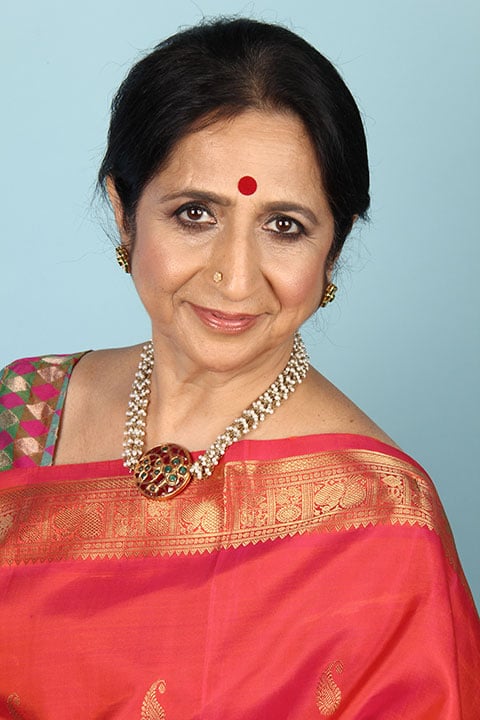30 Artists, 30 Years – Aruna Sairam
BF: Your unmistakable vocal style is rooted in the Carnatic tradition, and we at Bagri Foundation were thrilled to present ‘Back to the Blues’ with yourself, in association with Soumik Datta Arts. This was a unique evening of Indian contemporary music which saw you collaborating with British Indian composer Soumik Datta to explore the connections between Carnatic and Western musical traditions. The video recordings of the evening still convey the immersive experience of your collaboration and we would love to hear more about this and how it developed. How does it compare to your other collaborations and what do you get from this type of work?

AS: My congratulations to the members of the Bagri Foundation and the Bagri Family particularly to the Founder Director Smt Alka Bagri. I remember, with such great pleasure and happiness, being invited by Smt Alka Bagri Ji to participate in the collaborative concert ‘Back to the Blues’ in association with Soumik Datta Arts. The concert venue was the gorgeous St John Smith’s Square, Westminster, London.
Soumik Datta’s approach to his music and the construction of his music is truly special and unique. We worked for days to arrive at the initial framework of our approach. Several Skype calls, audio recordings exchange, notes and conversations later, we arrived at a loose selection of what we wanted to do. I was most impressed by the strategy that Soumik had adopted for our rehearsals. We were slated to rehearse for 5 days before the programme which is when all of us would meet face to face for the first time.
Right on Day 1, we received all the notes and cue sheets based on the discussions that Soumik and I had had during the previous months and with these notes, we started rehearsing and that gave us a head start into the process. This strategic and detailed (yet leaving room for changes) planning by Soumik, gave us magnificent results in a short time. Within five days we had the concert ready – complete with the understanding of how we, as a team, bonded emotionally and musically.
BF: Your unique style, rooted in tradition, has been defined as ‘continuously evolving in the contemporary’. How do you feel your approach to South Indian classical music has changed over the years? Do you find you have to adapt your approach to making traditional South Indian music for the next generation of audiences?
AS: Thank you for the generous compliment. The difference in my approach and the contemporary outlook that I have developed, started right in my childhood because I was raised in the cosmopolitan city of Mumbai. I was part of a South Indian family, with huge South Indian sensibilities, love for art, Carnatic music, love for storytelling, love for dance and so on but since I grew up in Mumbai in the loving care of open-minded parents, I was also exposed to street singers, folk singers who sang in Marathi and other languages, Hindustani Classical music… I was a member of the Western Music choir in my school and my parents often took me to listen to concerts of Western Classical conductors at Tata Theatre, Nariman Point, Mumbai. Then there was Hindi film music of those days and Tamil film music from Radio Ceylon- this was the Golden Era of film music. It was wonderful to have had the exposure to such a great variety of music. I was never told to not listen to any particular music. I was never told that a certain kind of music is good and the rest bad. It was left to me to explore and develop my taste in music. All of these lead me to develop a contemporary outlook on music.
Along with all these, I was trained by a hardcore classical Guru, Smt .T Brinda. So the combination of these opposing mindsets is what gives my music the uniqueness that you have so generously referred to. I have not consciously adapted it, I have just followed my instincts and sensibilities.
BF: On your website you state your long-term vision is to preserve the art of South Indian classical music for future generations. Can you share with us more on how you are working towards achieving this goal?

AS: Yes, I believe that I have to play a big part in preserving South Indian Classical Music for future generations because I have been the lucky inheritor of such divine grace from great gurus, my parents, and other mentors. In fact, the concert that I did with the Bagri Foundation ‘Back to the Blues’ was towards this goal. These kinds of concerts, I feel, go a long way in taking Carnatic core music to the young generation of today. On the one hand, I continue to do very hardcore traditional Carnatic music concerts, which I feel I should continue doing to keep the grip and depth that I have on it. On the other hand, with my feet firmly planted on that ground, I do a lot of collaborative work with musicians from other genres like with Mandolin Maestro U Srinivas, Shankar Mahadevan the star of Bollywood Music, Tabla Maestro Ustad Zakir Hussain, Dominique Vellard, the exponent of Medieval and Gregorian Chants… Not to forget, the wonderful collaboration with Soumik Datta and the brilliant musicians – Al MacSween on Jazz Piano, Cormac Byrne on Bodhran Irish frame drum, Pirashanna Thevarajah on Carnatic percussion (mridangam, morsing, Kanjira and Tambourine) for the Bagri Foundation. These experiences have helped towards the goal of taking Carnatic music to the young generation and to people from far-flung areas who were never before exposed to this art form.
Biography
Padma Shri awardee Aruna Sairam is widely acclaimed as the one of most illustrious exponents of Classical Carnatic music. She is a composer, collaborator, mentor, humanitarian, and speaker. In addition to her performances in India, Aruna has taken Carnatic music to the global arena, to prestigious venues including the Royal Albert Hall and Carnegie Hall. Currently Vice Chairperson of the Sangeet Natak Akademi, Ministry of Culture, Delhi, Aruna works towards the musical education of underprivileged students, through the Nadayogam Trust, which she founded in 2011. Aruna is grateful for the training she received under her mother Rajalakshmi Sethuraman, the legendary vocalist T. Brinda, and the mentorship from several other masters throughout her musical journey. Her music erased geographic borders when she incorporated Abhang, a Western Indian musical form, into a traditional, South Indian concert. Aruna sings in 14 Indian languages. She has won the prestigious Sangita Kalanidhi awarded by the Music Academy, Chennai, one of the most prestigious institutions for Carnatic Music in India.
Interviewed by Alessandra Cianetti, Project Manager – May 2020.


